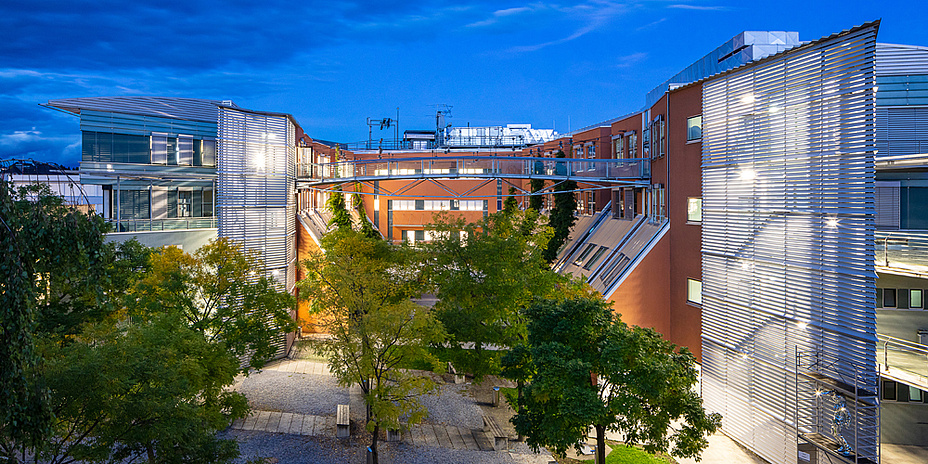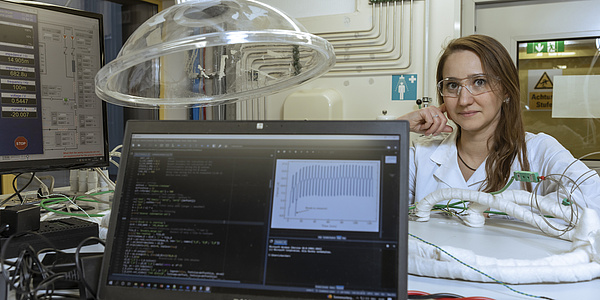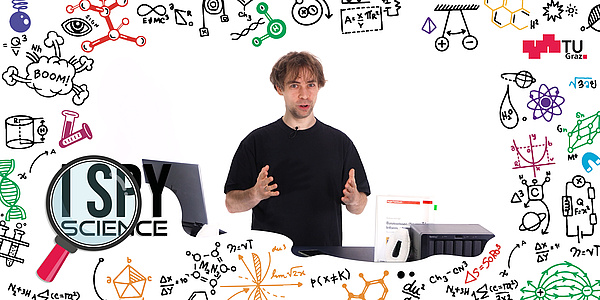TU Graz by night

17:00
It’s Wednesday evening and there is tense anticipation in the assembly hall of Graz University of Technology (TU Graz) on Campus Alte Technik. The guests on the densely packed rows of chairs murmur in quiet conversation – until the lights go out. A woman enters the assembly hall, illuminated by a spotlight: “I was the first woman in space!” The theatre evening begins.
It’s very busy at TU Graz during the day. Staff conduct research in laboratories, type at record speed on computer keyboards or teach in small and large lecture halls, while students scurry across the courtyard to the next lecture. But as the hour progresses, the campus empties – for those who work or study during the day, it’s time for a well-deserved evening off. The office doors are locked, and the lecture halls go dark. But not all the lights are going out at TU Graz. Even in the evening, even in the middle of the night and in the early hours of the morning, something is happening at our university.
In the evening, TU Graz often hosts a variety of events, such as – together with the equal opportunities offices of all four Graz universities – the theatre production “sternenfrauen” described at the beginning. The play by “portraittheater” and the Drachengasse theatre – both based in Vienna – depicts female pioneers of space exploration and is well received by the audience. The performance ends in loud applause before the guests discuss it animatedly over a buffet.
19:00
The main library at Technikerstrasse 4 is still brightly lit. Until 9 pm, employees and students can easily borrow books here with their TU Graz ID card or use the workstations and – after reservation – also group rooms. But even after that time you can still use the library’s services. The library offers a 24-hour pick-up service, so you can pick up pre-booked books at any time at the parcel station outside the entrance door. It is also possible to return media outside opening hours, simply use the practical book return box.
Visit www.tugraz.at/go/bibliothek for more info. By the way, the library of TU Graz is open to the public and its services are available to all interested parties.
20:00
Cheerful music resounds from the ground floor of Inffeldgasse 13. A dance class is taking place here and laughter emanates from the building. A few steps further on, in front of Inffeldgasse 25A, a low humming can be heard. The compressors of the Institute of Thermal Turbomachinery and Machine Dynamics (ITTM) are in operation. These air compressors are an important prerequisite for carrying out measurements on aircraft turbines, and at the same time one of the reasons why tests take place here at night. Compressors, wind tunnels and test rigs have such a high power requirement that the power grid of TU Graz would have difficulty coping with the additional load in normal operation during the day. If all of the institute’s test rigs were in operation at the same time, this would cause a grid load of about 6 megawatts. By comparison, the entire rest of Campus Inffeldgasse needs around 2.5 megawatts when all test rigs are in use.
Today, the second test is already underway at the Transonic Test Turbine Facility. A probe is measuring the air flows in the turbine. It has five small holes at the tip, which help to align it exactly in the middle of an air stream at the beginning of the measurements. Afterwards, it is repeatedly rotated circumferentially by 0.5 degrees at short intervals in order to be able to record the flows with pinpoint accuracy. Institute head Franz Heitmeir and his team enjoy international renown and prestigious partnerships: “Many people can measure, but not everyone can do it as precisely as we can.”
While laboratory manager Emil Göttlich or his colleague Yvonne Fuchs look after the machines, two researchers in the control room monitor the ongoing experiment. The ITTM team takes turns; today Lukas Wiesinger and Francesco Mangini are in action. Video display after video display is lined up on desks and a wall shelf above, the devices providing the researchers with information about everything that happens in the test hall and the turbine. The test rig is monitored and safety indicators signal when something is out of the ordinary. In addition, the researchers control the rotation of the probe from the control room with a click of the mouse, and several monitors document the measurement results. And live cameras show what is happening outside in the hall at the test stand – nobody is allowed to enter during a test – it’s too dangerous. Although there are viewing windows made of thick glass, most of these are additionally protected with wooden beams to ensure the best possible protection in the control room in the event of an unforeseen incident. It is shortly before half past eight, on the screen the probe rotates 0.5 degrees further.
21:00
Concentrated silence reigns diagonally opposite on the third floor of Inffeldgasse 10. The HTU (Students’ Union) Learning Centre is located here – students can use it around the clock. The 200+m2 space is divided into smaller areas to accommodate learning groups. In addition to tables and armchairs, whiteboards and a plethora of power sockets are also available. At this time of day, there is still a lot going on here. Students sit alone or in pairs in front of their laptops and get coffees from the vending machine in between.
If you want to spend the night at TU Graz, the Long Night of Research is a good opportunity to do so every second year. Here at our university – as well as at many other locations throughout Austria – you can experience science up close with free admission. Show your own research or come as a guest. The next Long Night of Research will take place on 24th May 2024. For more information, see www.langenachtderforschung.at.
And the annual Long Night against Procrastination offers students and researchers at TU Graz the optimal conditions to work on their (postponed) work. The next opportunity to do so is on Tuesday, 13th June 2023, from 5 pm in the Main Library, Technikerstrasse 4. For more information, see www.tugraz.at/go/LNAA.
22:00
At Inffeldgasse 25D, Edgar Bergmann of ÖWD goes on night duty. He knows Campus Inffeldgasse well; the security guard has been working here for three years. He is also a trained first aider and fire prevention officer. “The most important thing is to detect possible hazards and report them or eliminate the sources of danger,” explains Edgar Bergmann. Even supposedly small things can cause great damage, and this must be prevented: “Recently, for example, I discovered a dripping dishwasher during a round and immediately put a container under it.”
Edgar Bergmann completes two extensive rounds of the entire campus at night – always at varying times in the interest of burglary prevention. He walks quickly across the terrain, heading for almost 80 destinations, the so-called checkpoints. Doors have to be locked, window locks checked and every point conscientiously documented. This works with the electronic guard book on the smartphone – a short beep signals when a checkpoint is scanned and is recorded by the guard book.
At the beginning of Edgar Bergmann’s first round, the TU Graz Racing Team is in action in the courtyard, the students are tinkering with their racing car. But away from that, the lights at TU Graz become sparser, most of the buildings are deserted and dark at this time of day – no problem for Edgar Bergmann, he simply switches on his headlamp.
24:00
Quiet has already fallen at the ITTM today after work has been successfully done, but trials often continue into the early hours of the morning. For cases like this, where night work is necessary for research purposes, TU Graz has its own workplace agreements to protect employees. “We meticulously comply with all working time regulations and rest periods here at TU Graz,” stresses Franz Heitmeir.
The requirements for night work (rest breaks, bonuses, ...) at TU Graz are regulated in separate workplace agreements on the basis of legal provisions. For general staff, the workplace agreement pursuant to Section 55a (2) Univ-KV (night work) applies. For academic staff, the workplace agreement on working hours for academic and artistic staff applies. Further information can be found in the “Mein Dienstverhältnis” section of the TU4U intranet.
But it is not always that every experiment works out as planned. The day before, a power failure in the afternoon interrupted the thorough preparations necessary to operate the test rig while ensuring all safety precautions, thus preventing the planned evening programme. Emil Göttlich took it with good humour: “It’s part of everyday research.” Researcher Nicolas Krajnc also remained relaxed, even though he depends on the measurement results for his dissertation – he is confident that everything will go according to plan in the coming nights.
A test series at the institute usually lasts a few months, with tests being carried out two nights a week. In order to make up for lost time, the ITTM is currently very busy and the test rig is in operation a full four nights a week – provided everything goes smoothly. Once a series of tests has been completed, the nights are used for sleeping again and the days for evaluating the results – until the test rig is set up some time later and ready for the next test.
Find out even more about research at the Institute of Thermal Turbomachinery and Machine Dynamics on the website www.tugraz.at/institute/ittm and in this article in TU Graz’s News + Stories.
02:00
Quiet whirring fills one of the server rooms of IT Services at Campus Neue Technik in the basement of Steyrergasse 30 twenty-four hours a day. Multicoloured cables bring colour into the white and grey network cabinets. A CO2 monitor shows how large the concentration of carbon dioxide in the air is. At this time of day, however, an excessive concentration here could not affect anyone, the servers work for themselves – and for them, the room temperature, which also appears on the display, is much more relevant. Necessary maintenance work usually takes place in the evening; at night there are only “emergency responses” if, for example, the power supply fails. Today, the servers hum undisturbed.
04:00
Edgar Bergmann from ÖWD still has a watchful eye on Campus Inffeldgasse. It is now time for him to unlock all the external doors again so that the first employees have access to the buildings early in the morning. How does he keep awake for so long and still remain alert? “Oh, that’s no problem at all, it’s just called sleep postponement,” says Edgar Bergmann, waving it off. He simply gets up later. The only difficulty is switching between night and day shifts when the sleep deficit cannot be compensated for so easily.
Today, Edgar Bergmann has taken about 30,000 steps on each of his rounds. “If everything was in order, then it was a successful night,” he sums up. Before the night shift ends at 6 am, the cleaning staff still have to be given the right keys so that everyone can get into the rooms they are in charge of. After handing over duty to the subsequent colleague, it’s off home.
05:30
The canteen at Inffeldgasse 10 is already bustling at an early hour. Chef Horst Wolfgruber has already been on duty for half an hour, taking deliveries of food and starting to cook: “Being the first to start so early is pleasant because it’s still so quiet.” With the delicious aroma of bread rolls and croissants already wafting through one part of the kitchen, a huge amount of “hunter’s” sauce is simmering for lunch opposite. Horst Wolfgruber and his team not only cook here for Campus Inffeldgasse, they also supply the Rooftop canteen at Campus Neue Technik and the canteens of the University of Graz and the University of Music and the Performing Arts.
Meanwhile, Elisabeth Posch fills fresh lye rolls and carefully arranges them in the M-Café’s display. She has been at work since 5 am, an hour earlier than usual. Due to an event at Campus Inffeldgasse, a large crowd is expected and there is a lot to prepare before the doors open at 7 am for the first guests of the day. She is supported by Katrin Koch, who usually works in the canteen office but is now actively helping out in the M-Café.
If your appetite has been whetted, perhaps for the canteen’s dish of the day, you can find the current range of culinary delights at www.mensen.at.
06:00
Building and Technical Support staff at the three campus locations start their working day, and letters are already being sorted in the central post room. The cleaning staff are in action, preparing TU Graz for the new day. In the first offices, the computers are being booted up. Those who have been on duty for TU Graz in the past hours can now hopefully get a good night’s sleep – until the next night at least.




